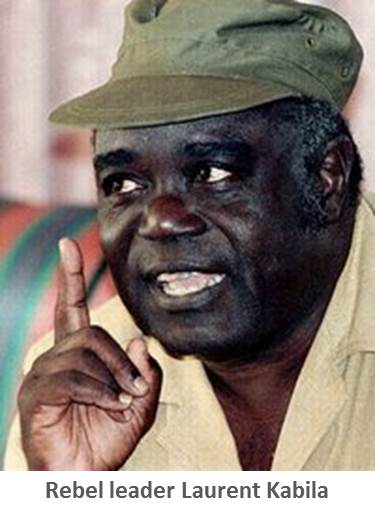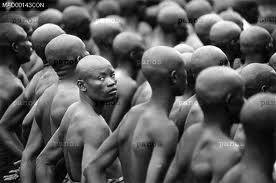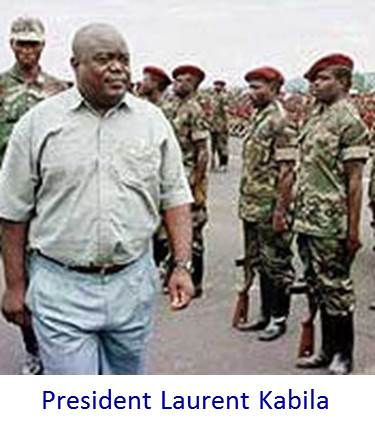TIMELINE
FIRST CONGO WAR (1996-1997)
Early 1996. With no progress on repatriation of the one million Hutu refugees to Rwanda, and with the former génocidaires among them continuing to launch cross-border attacks against Rwanda…local politicians in eastern Congo launch an ethnic cleansing campaign against Congolese Tutsis; President Mobutu supports the Hutus’ anti-Tutsi ethnic cleansing campaign; and the Tutsi-led Government of Rwanda repeatedly warns that it will intervene in the Congo if the attacks do not stop.
Oct 1996. After 20 years in exile, the anti-Mobutu rebel Laurent-Désiré Kabila suddenly emerges in eastern Congo. He is now the leader of a new Congolese Tutsi rebel group, the AFDLC (Alliance des Forces Démocratiques pour la Libération du Congo-Zaïre / Alliance of Democratic Forces for the Liberation of Congo-Zaire. The AFDL rebellion seeks to prevent attacks on Congolese Tutsis by forcing the Rwandan Hutu refugees back to Rwanda, and to overthrow the Mobutu government—which garners support among many Congolese. With strong support from Rwanda, Uganda and Burundi, the AFDLC quickly takes control of a large portion of eastern Congo. President Mobutu is in Europe undergoing cancer treatment.
Nov 1996. Violent anti-Mobutu protests erupt in Kinshasa. In the east, Kabila announces a unilateral 3-week ceasefire to allow desperately needed humanitarian aid to reach the one million Rwandan Hutu refugees in camps in eastern Zaire.
Dec 1996. Brutal attacks by the ADFL rebels push as many as 700,000 Rwandan Hutu refugees back to Rwanda. Tens of thousands of Congolese citizens in the eastern region flee their home to avoid the fighting. Armed ‘Mai Mai’ groups (including “boy soldiers” as young as 12) emerge to defend their villages. Locals accuse the Congolese Army of looting and attacking them.
President Mobutu returns briefly to Zaire. Many in Kinshasa welcome Mobutu’s return in the expectation that he will end the rebellion.

Feb 1997. With remarkable speed, the AFDLC takes town after town and region after region, as the Congo Army retreats.
Mar 1997. The AFDLC takes control of Kisangani, the Congo’s third largest city. In Kisangani, the AFDL fighters force 20,000 Rwandan Hutu refugees out of their camps. [photo link]
Apr 1997. The Congo Parliament elects opposition leader Etienne Tshisekedi as Prime Minister (for his third time). Tshisekedi immediately annuls the constitution, dissolves Parliament and announces a new government (which he doesn’t have the authority to do), and offers six Cabinet seats to the ADFL rebels (who decline). Mobutu fires Tshisekedi one week later.
The ADFL awards a US$1 billion (or $2 billion?) mining contract to America Mineral Fields, which then gives the rebels $1 million (and perhaps as much as $50 million) as an advance payment.
Well-financed and strongly supported by Rwanda, Uganda, and Burundi, ADFL takes control Lubumbashi, Congo’s second largest city and its main mining centre. Allegations surface of systematic AFDL massacres of Hutu refugees in Kisangani.

May 1997. Tens of thousands of Rwandan Hutu refugees arrive on the western border of Zaire, having walked nearly 1000 miles across the country, fearing reprisals by Tutsi forces in eastern Congo and in Rwanda. President Mobutu returns to Kinshasa, then flees to neighbouring Republic of Congo along with his senior officers.
Laurent Kabila is inaugurated as President. He renames the country, the Democratic Republic of the Congo—its name at independence in 1960. President Kabila promises a referendum on a new constitution by December 1988, and presidential and parliamentary elections by April 1999. He names a Cabinet composed mostly of his ADFL compatriots, names himself as Minister of Defence, and abolishes the positions of Vice President and Prime Minister.
The 32-year Mobutu era is over.
Angry supporters of Prime Minister Etienne Tshisekedi protest in Kinshasa and charge that President Kabila is beholden to the Congolese Tutsi minority in eastern Congo. Instances of brutality by ADFL forces in the capital are recorded.
Sep 1997. Mobutu dies in exile in Morocco.
NEXT: Second Congo War (1998-2003)





